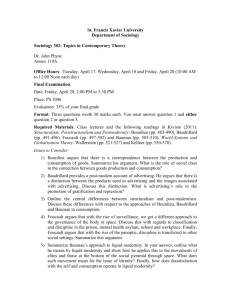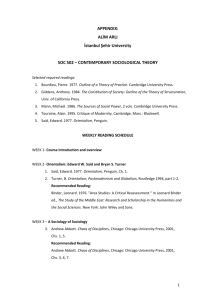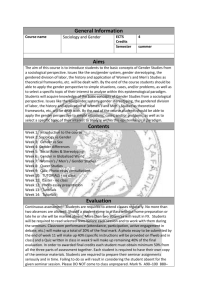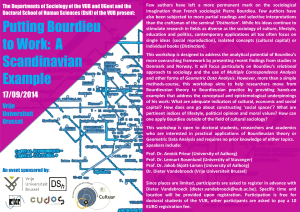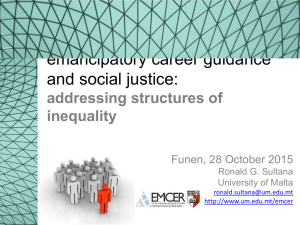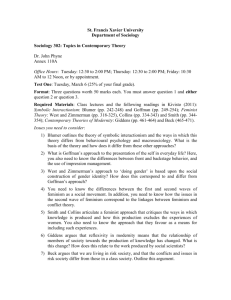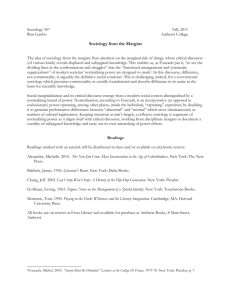201213moderntutorialtopics
advertisement
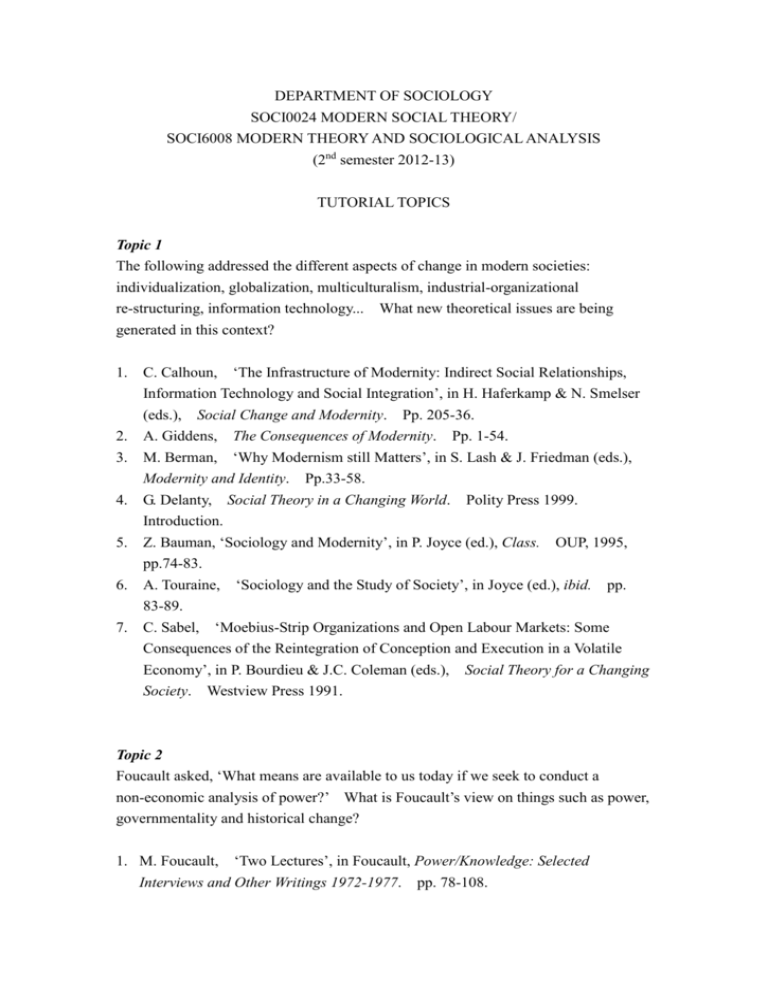
DEPARTMENT OF SOCIOLOGY SOCI0024 MODERN SOCIAL THEORY/ SOCI6008 MODERN THEORY AND SOCIOLOGICAL ANALYSIS (2nd semester 2012-13) TUTORIAL TOPICS Topic 1 The following addressed the different aspects of change in modern societies: individualization, globalization, multiculturalism, industrial-organizational re-structuring, information technology... What new theoretical issues are being generated in this context? 1. C. Calhoun, ‘The Infrastructure of Modernity: Indirect Social Relationships, Information Technology and Social Integration’, in H. Haferkamp & N. Smelser (eds.), Social Change and Modernity. Pp. 205-36. 2. A. Giddens, The Consequences of Modernity. Pp. 1-54. 3. M. Berman, ‘Why Modernism still Matters’, in S. Lash & J. Friedman (eds.), Modernity and Identity. Pp.33-58. 4. G. Delanty, Social Theory in a Changing World. Polity Press 1999. Introduction. 5. Z. Bauman, ‘Sociology and Modernity’, in P. Joyce (ed.), Class. OUP, 1995, pp.74-83. 6. A. Touraine, ‘Sociology and the Study of Society’, in Joyce (ed.), ibid. pp. 83-89. 7. C. Sabel, ‘Moebius-Strip Organizations and Open Labour Markets: Some Consequences of the Reintegration of Conception and Execution in a Volatile Economy’, in P. Bourdieu & J.C. Coleman (eds.), Social Theory for a Changing Society. Westview Press 1991. Topic 2 Foucault asked, ‘What means are available to us today if we seek to conduct a non-economic analysis of power?’ What is Foucault’s view on things such as power, governmentality and historical change? 1. M. Foucault, ‘Two Lectures’, in Foucault, Power/Knowledge: Selected Interviews and Other Writings 1972-1977. pp. 78-108. 2. C. Gordon, ‘Afterword’, in ibid. pp. 229-259. 3. J. Simon, ‘Discipline and Punish: the Birth of a Postmodern Middle-Range’, in D. Clawson, Required Reading: Sociology’s Most Influential Books. Boulder. 4. M. Foucault, The Birth of the Clinic: an Archaeology of Medical Perception. Ch.7, ‘Seeing and Knowing’. 5. M. Foucault, The History of Sexuality. Pp.3-13. 6. M. Foucault, ‘Governmentality’, in G. Burchell et.al. (eds.), The Foucault Effect. University of Chicago Press, 1991. 7. Sven-Ake Lindgren, ‘Michel Foucault’, in H. Andersen & L.B. Kaspersen (eds.), Classical and Modern Social Theory, pp. 294-308. 8. M. Dean, ‘Foucault, Government and the Enfolding of Authority’, in A. Barry (ed.), Foucault and Political Reason. UCL Press 1996. Topic 3 What is Bourdieu’s distinctive approach to sociological analysis of social structure, social inequalities and culture? 1. P. Bourdieu, ‘Habitus’, in J. Hillier & E. Rooksby (eds.), Habitus: a Sense of Place, pp. 27-34. 2. P. Bourdieu, ‘Social Space and Symbolic Space’, in D. Robbins (ed.), Pierre 3. 4. 5. 6. 7. Bourdeiu vol. 4, pp. 3-16. K. Maton, ‘Habitus’, in M. Grenfell (ed.), Pierre Bourdieu: Key Concepts. Acumen 2008. P. Thompson, ‘Field’, in M. Grenfell (ed.), op.cit. B. Skeggs, ‘(Dis)Identification of Class: On not Being Working Class’, in D. Robbins (ed.), Pierre Bourdieu 2, vol. 3, pp. 207-41. P. Bourdieu, The Weight of the World, ‘The Order of Things’, pp. 66-76. C. Calhoun, ‘P. Bourdieu’. (www.nyu.edu/classes/calhoun/Theory/paper-on-Bourdieu.htm) 8. C. Calhoun, ‘On Pierre Bourdieu, Outline of a Theory of Practice’, in D. Clawson (ed.) Required Reading: Sociology’s Most Influential Books. 1998 9. B. Longhurst & M. Savage, ‘Social Class, Consumption and the Influence of Bourdieu: some critical issues’, in S. Edgell et.al. (eds), Consumption Matters. Blackwell, 1996. 10. T. Butler, ‘Social Capital and the Formation of London’s Middle Classes’, in T. Blokland & M. Savage (eds.), Networked Urbanism: Social Capital in the City. Ashgate 2008. Topic 4 Give a critical account of Giddens’ The Consequences of Modernity. 1. A. Giddens, The Consequences of Modernity. 2. B. Barnes, ‘The Macro/Micro Problem and the Problem of Structure and Agency’, in G. Ritzer & B. Smart (eds.), Handbook of Social Theory, pp. 339-352. 3. J. Clark et.al. (eds.), Anthony Giddens: Consensus and Controversy. 4. G. Delanty, Social Theory in a Changing World. Ch.6 “Reflexive Modernization: Beck and Giddens’. Topic 5 In what ways has Beck’s ‘risk society’ forced us to rethink both the meta-theoretical and the substantive issues in modern social theory? 1. U. Beck, World Risk Society. Pp. 1-71; 91-108; 133-152. 2. U. Beck, ‘From Industrial Society to the Risk Society’, in M. Featherstone (ed.), Cultural Theory and Cultural Change. 1992. 3. U. Beck, ‘The Reinvention of Politics: Towards a Theory of Reflexive Modernization’, in U. Beck, A. Giddens & S. Lash (eds.), Reflexive Modernization. 1994. 4. U. Beck, Risk Society: Towards a New Modernity. Sage 1992. Introduction, Preface and Ch.2. 5. G. Mythen, Ulrich Beck: a critical introduction to the risk society. Pluto Press 2004. Introduction and Ch.1. 6. U. Beck and C. Lau, ‘Second Modernity as a Research Agenda: theoretical and empirical explorations in the ‘meta-change’ of modern society’, British Journal of Sociology, 56:4. 2005, pp. 525-57. 7. D. Bell, ‘Afterword 1996’, in The Cultural Contradictions of Capitalism. Pp. 283-339. Topic 6 What are the contemporary experiences and meanings of class under Sennett’s ‘new capitalism’? What kind of character/identity formation is possible, and what are the implications for the ‘self’? 1. R. Sennett & J. Cobb, The Hidden Injuries of Class. Pp. 1-51. 2. R. Sennett, The Corrosion of Character: the Personal Consequences of Work in the New Capitalism. Chs. 1, 3 & 4. 3. R. Sennett, The Culture of the New Capitalism. Yale Univ Press 2006. (electronic version) 4. R. Sennett, Together: the rituals, pleasures and politics of cooperation. Yale. 2012. Topic 7 ‘Sociology is itself a story – but the message of this particular story is that there are more ways of telling a story than are dreamt of in our daily story-telling, and that there are more ways of living than is suggested by each one of the stories we tell and believe in, seeming as it does to be the only one possible.’ (Z. Bauman) What stories has Bauman offered us in regard to love, work, freedom, security, etc.? Z. Bauman, ‘Falling in and out of Love’, in Liquid Love. Pp. 1-37. Z. Bauman, The Individualized Society. Pp. 1-56; 140-152. T. Zeldin, An Intimate History of Humanity. Pp.1-51. Z. Bauman & K. Tester, Conversations with Zygmunt Bauman. Polity 2001. Convesration 4. 5. Z. Bauman, Living on Borrowed Time: Conversations with Citali Rovirosa-Madrazo. Conversation VIII (‘Utopia, Love or the Lost Generation’). Polity Press 2010. 1. 2. 3. 4. 4. L. Nicholson & S. Seidman (eds.), Politics. 1995. Social Postmodernism: Beyond Identity Topic 8 What is ‘public sociology’ according to Burawoy? What kind of public sociology do you think is represented by the works of Bellah and his associates? 1. M. Burawoy, ‘For Public Sociology’, American Sociological Review. 70:4-28. 2005. 2. C. Calhoun, ‘The Promise of Public Sociology’, in British Journal of Sociology, 56:355-363. 2005. 3. R. Bellah et.al. ‘Individualism and Commitment in American Life’, in S. Seidman & J. Alexander (eds.), The New Social Theory Reader: Contemporary Debates. 306-314. 4. R. Bellah, ‘Community Properly Understood: a Defense of Democratic Communitarianism’, in A. Etzioni (ed.), The Essential Communitarian Reader. Pp. 15-19. 5. R. Dahrendorf, ‘A Precarious Balance: Economic Opportunity, Civil Society, and Political Liberty’, in A. Etzioni (ed.), ibid. pp. 73-94. 6. C. Taylor, ‘The Making of Modern Identity’, in Seidman & Alexander (eds.), ibid. pp. 315-320. T. Wong Jan 21, 2013
